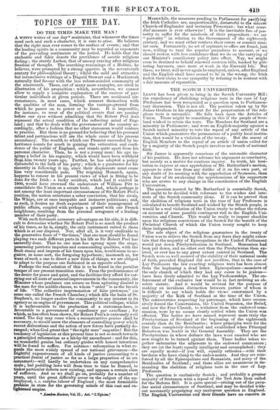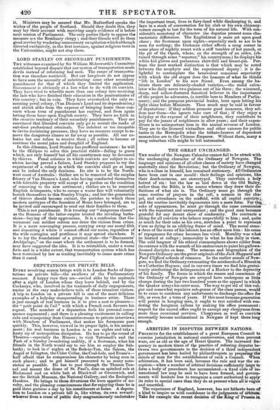THE SCOTCH UNIVERSITIES.
LEAVE has been given to bring in the Scotch University Bill : the expediency of abolishing religious tests in the case of Lay Professors has been recognized as a question open to Parliamen- tary discussion. This is not all. The position taken up by Sir. James Graham in his argument for the perpetuation of the reli- 'ous tests is untenable. He falls back unon the Articles of Union. There might be something in this if the people of Scot- land wished to retain the tests. The Members for Scotland are a minority in Parliament; and were an English majority against a Scotch united minority to vote the repeal of any article of the Union which guarantees the permanence of a purely local institu- tion, that would be a violation of the treaty. But the assent of English Members to the repeal of an article of union called for• by a majority of the Scotch people involves no breach of national faith.
Sir James is apparently conscious of the untenable character of his position. He does not advance his argument as conclusive, but merely as a motive for cautious inquiry. In truth; hit hesi- tation to express at once approbation of Mr. Rutherfurd's motion, appears to arise less from any dislike of it on his own part, or any doubt of its meeting. with the approbation of Scotsmen, than from fear of its awakening the apprehensions of his su rs who are averse to any change in the constitution of the nglish Universities.
The question mooted by Mr. Rutherfurd is essentially Scotch, and ought to be decided with reference to the wishes and inte- rests of the Scotch community alone. If it can be proved that the abolition of religious tests in the case of Lay Professors is calculated to benefit Scotland and wished by the Scotch people, it would be a real violation of the Union treaty to refuse the reform on account of some possible contingent risk to the English Uni- versities and Church. This would be really to impose shackles upon the religious convictions of the Scotch for the benefit of the Prelatical Church of which the Union treaty sought to keep them independent. The sole object of the religious guarantees in the treaty of Union was to relieve the Scotch from any fears they might entam- tain that the majority of Ep.iscopalians in the United Parliament would put down Presbyterianism in Scotland. Romanism had been put down, and no other sect than the Presbyterian then ex- isted, or ever has to any great extent existed in Scotland. The Scotch were so well assured of the stability of their national mode: of faith, provided England did not interfere, that in the case of Lay ProfesSors the law exacting religious tests has been almost from the beginning a dead letter. Episcopalians—members of the only church of which they had any cause to be jealous— have been freely admitted to the Lay Professorships, The en- forcement of the exclusive law would be in fact reviving an ob- solete statute. And it would be revived for the purpose of making an invidious distinction between parties of whom it is difficult to say which holds the views entertained by a majority of the Kirk of Scotland at the time of the Union.. The controversies respecting lay patronage, which have succes- sively forced the Cameronians, the United Secession, the Relie4 and now the Free Church, to withdraw from the endowed com- munion, were by no means clearly settled when the Union was, effected. The bodies we have named represent more truly the Presbyterians of Scotland at the beginning, of the eighteenth century than do the Residuaries ; whose principles were for the• first time completely developed and established when Principal Robertson was leader in the General Assembly. They are the Presbyterians in whose defence the laws were enacted who are now sought to be turned against them. These bodies taken to- gether • outnumber the adherents to the endowed communion ; they are (at the least) equally intelligent and accomplished ; they are equally moral—if you will, equally orthodox—with their. brethren who have clung to the endowments. And they are rein-, forced by all the Episcopalians and Romanists, and many of the, Residuaries of Scotland ; and these allies are, unanimous in de- manding the abolition of religious tests in the case of Lay Professors.
The question is exclusively Scotch ; and probably a greater. majority of Scotsmen wish a repeal of the Test Acts than called, for the Reform Bill. It is quite special—arising out of the pecu- liar social circumstances of Scotland, and may be decided with- out necessarily prejudging any analogous question in England. The English, Universities and their friends have no concern in
it. Ministers may be assured that Mr. Rutherford speaks the wishes of the people of Scotland. Should they doubt this, they may lay their account with receiving ample evidence of it before next session of Parliament. The only parties likely to oppose ths measure are the Residuary clergy ; and their friends will do them good service by rendering unnecessary an agitation which although directed exclusively, in the first instance, against religious tests in the Universities, might not stop there.



























 Previous page
Previous page